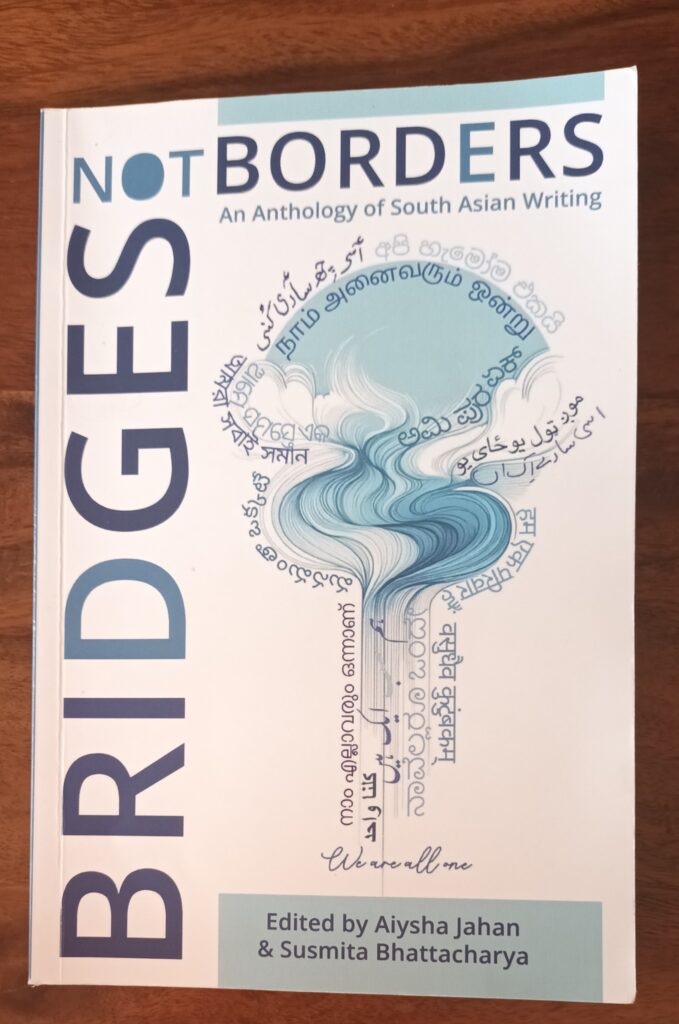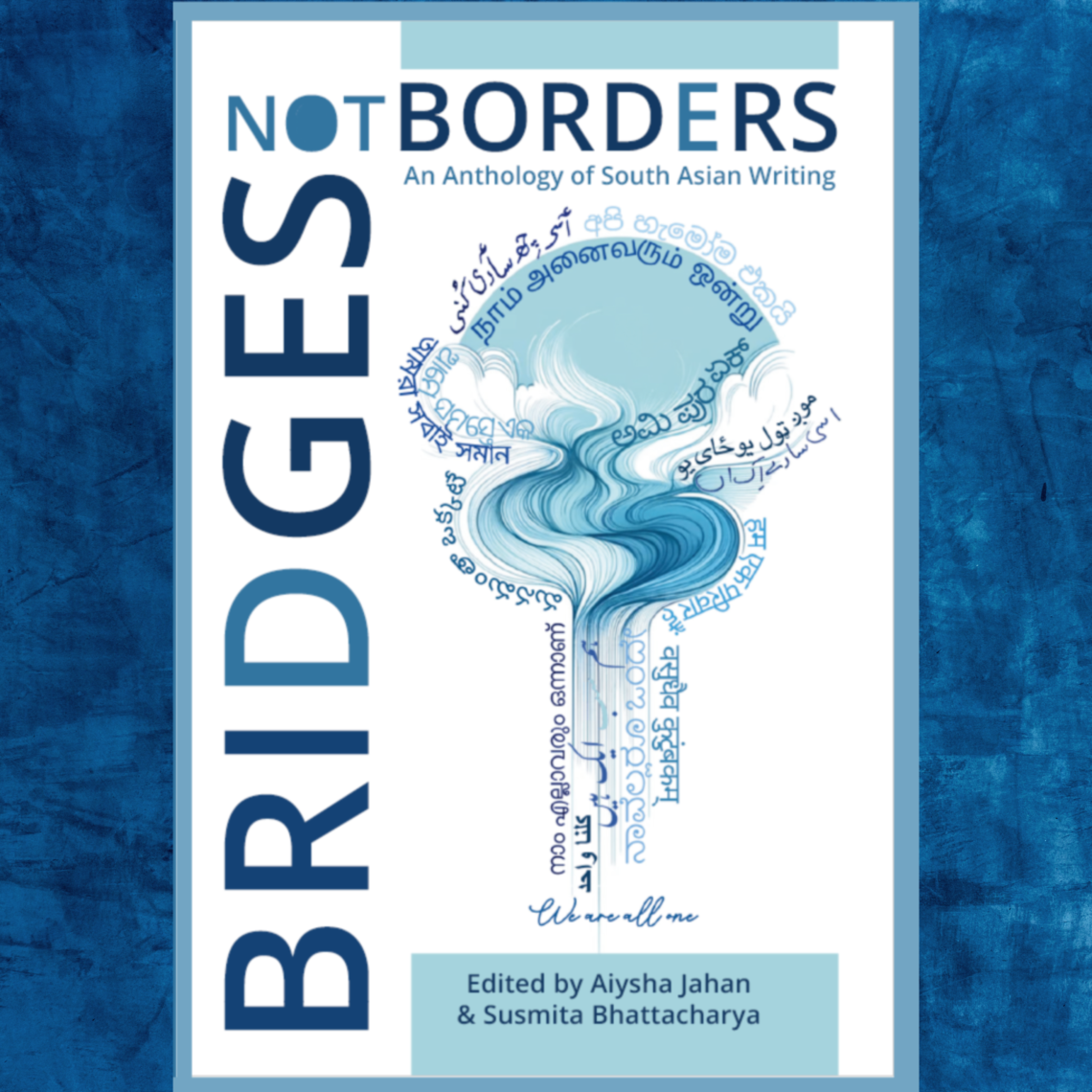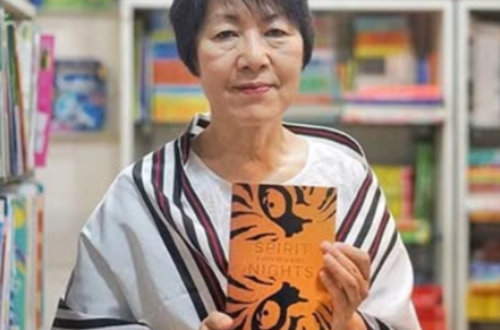Asha Krishna
Genre: Short Fiction
Publisher: Dahlia Books (ISBN 978-1-913624-14-9)
Price: £10
Pages: 176
“When he was ten, all of Cam’s waking dreams had been about the death of his mother. Now he doesn’t care if she lives or dies,” goes the line from the story “Invisible bridges burn the brightest.”
It is this voice that grabs the reader right from the outset, one amongst the dazzling cluster of stories featured the anthology, Bridges Not Borders.
A brainchild of Susmita Bhattacharya and Aiysha Jahan — accomplished writers with years of experience — the short story collection was developed as an extension of the Write Beyond Borders Project, and funded by the Arts Council England and Humanities Research Council.
The Write Beyond Borders Project, conceived with the objective of building connections through South Asian art and literature, has been going strong since 2021.
The project’s aim to build connections and sustain them through literary initiatives shows in the anthology’s content which boasts of an impressive geographical line-up: short stories range from Mukhtsar in Punjab to Quetta in Pakistan, from Dhaka and Singapore to Phoenix in Arizona.
It is remarkable how the writers have offered their unique take on the theme. Whether it is about a teacher and a student on either side of the North India–South India divide in “Aaaaee”, a husband and wife’s East–West clash over their daughter’s choice in “The law of marriages,” the classic generational differences between a mother-in-law and a daughter-in-law in “Eavesdropping Shamelessly,” or societal expectations embroidered with cleverly placed Urdu phrases in “Tea with a side of flowers,” each story sparkles with insight and observation that is uplifting in its approach.
It is interesting to perceive how writers have employed the Asian “indicators” (for example, the quintessential fruit in “Athu eats a mango” or the intricacies of Indian classical dance in “Teental”) and mould it around their individual worlds and characters. Noted writer Prajwal Parajuly’s observations on the collection are spot on when he says in his foreword: “There is a surefootedness that makes reading it a pleasure.”
It is this confidence in craft and the interweaving of subtle themes that elevate these stories into a great reading experience. Farah Ghuznavi, acclaimed writer and editor says about the collection: “The richness and diversity of the characters, cultures, and experiences it showcases range from the mundane to the exceptional, and everything in between.” People inhabiting these stories come from different areas of life but their personas come alive on the pages through their aspirations and prejudices, which then offers a sharp insight into how contemporary society — often how Asian society — operates.
It is not only the characters but also the narrative style that plays an important part in how the story is told, while hinting at various underlying themes. For example, “Myself Durges,” nominated for a Pushcart Prize, is a short story that breaks all the rules of English grammar. However, in doing so it delivers a compelling take on the dominant status enjoyed by a majority community. The story is a matter-of-fact account of a farmer’s son moving to the city for a better life, while highlighting the dominance of linguistic priority at a global level: “They ask what my caste is but not ask what my story is. They not listen what I say. But I speak English means they hear.”
These stories do not restrict themselves to adhering to the themes and craft alone. Many of the stories are bold enough to take on the tough role of looking inwards and highlighting the uncomfortable truths and biases prevalent in the South Asian culture.
“The law of marriages” lifts the curtain from the concept of stable Indian marriages. “Pea Soup” highlights the conscious and unconscious discrimination at various levels in Asian society and captures that prickly feeling when the majority becomes the minority. “Eavesdropping Shamelessly” delves into gender preference and cultural bias laced with societal expectations before ending on a reconciliatory note.
And even these harsh cultural shortcomings are laced with a ray of hope: whether it is solidarity between the neighbours in “Two Women,” nostalgia in “Yellowed Pages and Dinner Rolls,” or the fantastical element in “A good mother.”
Lined with anguish, grief, unrequited love, hypocrisy and the “what could have been,” these stories shine bright with a positivity that makes one want to go back to them again.
Editors Susmita Bhattacharya and Aiysha Jahan admit to being struck by the range of voices, places and narratives: “This anthology seeks to celebrate that which unites us, rather than that which divides. Please, read these stories, support these writers and help us build bridges not borders.”
At a time when borders are becoming more of a barrier, this anthology plays a vital role in breaking down boundaries through literature.
Read it for the joy of discovering miniature worlds in these beautifully woven narratives. Read it if you like a story well told.

The book can be purchased here.

Creative soul, Storyteller. Asha dabbles in all forms of writing — short stories, flash, CNF, book reviews. She lives in Leicestershire, UK. If not writing, she loves working with yarns, recipes or her vocal chords, driving around a wannabe football legend and a glamourous teenage cricketer to their training sessions. With Twitter’s (@ashkkrish) charm hitting rock bottom, she is now dipping her toes into Instagram (@ashkrishwrites) and Bluesky social (@ashkrish).
Book cover from the WBB website and book photo by Asha Krishna




